In the News–Reputation Management
What Mark Zuckerberg Got Wrong In His 1300-Word Facebook Memo
Jena McGregor, Forbes, October 7, 2021
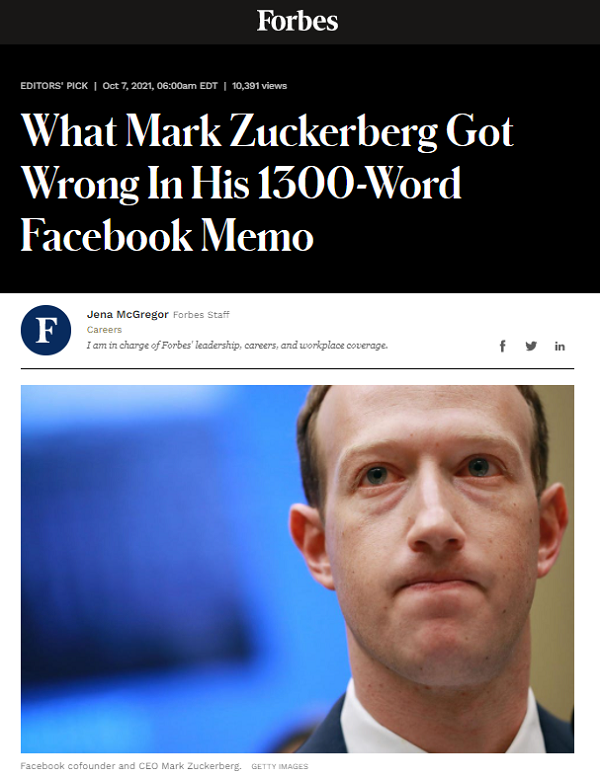
Facebook CEO Mark Zuckerberg finally weighed in on the escalating crisis at the social media giant on Tuesday with a lengthy missive that downplayed risks and hit the wrong note with people on and off the platform, doubling down on his defense of the company.
The memo followed stunning whistleblower testimony, a series of damaging media reports and one of the longest outages of the platform in its history on Monday, when a falling stock price prompted Zuckerberg to temporarily drop on the Forbes 400 list before rebounding.
Communications advisers criticized Zuckerberg’s more than 1,300-word memo to employees for being too long, defensive and out of tune with the emotionally charged debate playing out over the social media platform’s role in society. The memo launched with a technical term about the outage, lobbed a series of rhetorical questions and defended Instagram’s impact on teenage girls’ mental health.
***
For many people, Facebook has become so emotional – and its impact on society, democracy and mental health so personal – that a response that doesn’t take that tone is lacking, advisers said.
Especially during the pandemic, said Davia Temin, the founder of a reputation and management consulting firm, Facebook has become a tool to which many people are emotionally connected after so much time at home alone.
But in the response, “he’s missing that emotional quotient, and he’s missing it by a mile,” she said. (Temin is also a contributor to Forbes.)
“As a CEO you have to appreciate points of view that are not your own. You may be convinced with every cell of your body they may be wrong but nonetheless you have to take it into consideration and you have to respond to it.” […read more]
“There’s a ‘Fanatical Group of Worshippers’ in Your Stock. What’s Next?”
Lindsay Frost, Agenda, June 28, 2021

AMC Entertainment Holdings CEO Adam Aron has been actively embracing on Twitter, YouTube and other platforms a new trove of investors who propelled the company’s stock price up more than 300% in the past month. The latest Reddit-driven phenomenon has companies reconsidering how to communicate with these investors and encourage them to stick around — especially for those companies that could use the investment to pay off debt and invest in innovations.
The so-called meme stock frenzy, which has led to a deluge of retail investors pouring into AMC, GameStop, Clover Health and the GEO Group, is a hotly debated topic on Wall Street, but for boards overseeing companies that suddenly have an influx of retail investors, sources say it’s important to nail down the right messaging, consider incentivizing these investors and use the cash wisely.
“This brave new world of all of these Internet platforms and every person having their own voice has the power to whipsaw pretty much everything we thought we knew, and that extends to the fundamental value of stock,” says Davia Temin, president and CEO of risk consulting firm Temin & Co. “The wise board, and certainly the wise company, has to understand what is going on and figure out the way to communicate to all parties in a way that engenders trust.” […read more]
Red Corporation, Blue Corporation? Corporate political speech becomes a board issue
April Hall, Directors & Boards, 2021 Second Quarter

After the January 6 attack on the U.S. Capitol, many companies announced that they would halt political contributions, either permanently or for a defined period. Some discontinuations involved a particular political party, some individual legislators and some were complete stops on all contributions.
In the age of “cancel culture,” when social media can circulate calls for boycotts to millions of people in minutes, some companies have begun to act quickly, with either their words or their wallets, to distance themselves from political controversy But there are other companies that have leaned in to a variety of public political positions. This raises the question: Are some companies becoming recognized as “blue” (Democrat-supporting) or “red” (Republican-supporting), or even “purple”? And are such associations good for a company, its shareholders and its stakeholders?
***
Crisis communications consultant Davia Temin says she often encourages her client companies to take apolitical stands.
During political or social upheaval, sometimes “corporations have to become the adults in the room,” Temin says. Corporations need to maintain some neutrality, “but it’s the difference between making sure that as a corporation you have a purpose and if you’re true to purpose.”
However, she doesn’t usually advise being outwardly political. She says there is a difference between having a “political point of view” and speaking out about a “behavior,” like systemic racism.
“I still think strict political lines are not the way to go,” Temin says.
She also doesn’t support the legal idea behind the Supreme Court’s landmark 2010 decision in Citizens United v. FEC, which said the free speech clause of the First Amendment prohibits the government from restricting corporations’ independent expenditures for political communications. The decision has been popularly associated with the notion of “corporate personhood.”
“Corporations are not people,” Temin says. “They are conglomerations of people, and they need big tents for their clients, employees and other stakeholders.
“That is different than having a sole political point of view.” […read more]
Felicity Huffman lands 1st acting role since college admissions scandal
Good Morning America, December 1, 2020
The actress, who served 11 days in jail after pleading guilty in the Varsity Blues scandal, will star in an ABC comedy as the unlikely owner of a minor league baseball team.
“She’s been truly contrite and regretful, remorseful, about what she did,” said Davia Temin. “She comes out, maybe, with a renewed sense of purpose. That’s something that really works for reputation rehabilitation. Because it’s real.”
Franklin Fires Staffer the Day After Park Video Goes Viral
Annie Massa, Bloomberg, May 26, 2020
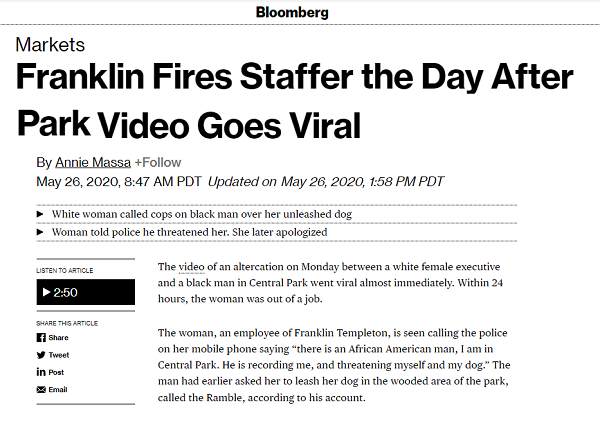
The video of an altercation on Monday between a white female executive and a black man in Central Park went viral almost immediately. Within 24 hours, the woman was out of a job.
The woman, an employee of Franklin Templeton, is seen calling the police on her mobile phone saying “there is an African American man, I am in Central Park. He is recording me, and threatening myself and my dog.” The man had earlier asked her to leash her dog in the wooded area of the park, called the Ramble, according to his account.
The incident underscores the nature of race relations in the U.S., in which African-Americans have faced outbursts — and worse — while simply going about their business. It also demonstrates that companies are increasingly holding employees accountable even for behavior that occurs outside the office.
“We’re living in chaos and predictable responses are going out the window,” said Davia Temin, founder of New York City crisis consultancy Temin and Co. “What wisdom would tell you, is to just walk away. But that usually takes a less stressful environment, and right now all the ions are charged.” […read more]
‘Sometimes the Crisis Makes the Leader’: Andrew Cuomo and Five Lessons on Leadership
Kathryn Dill and Te-Ping Chen, The Wall Street Journal, April 8, 2020
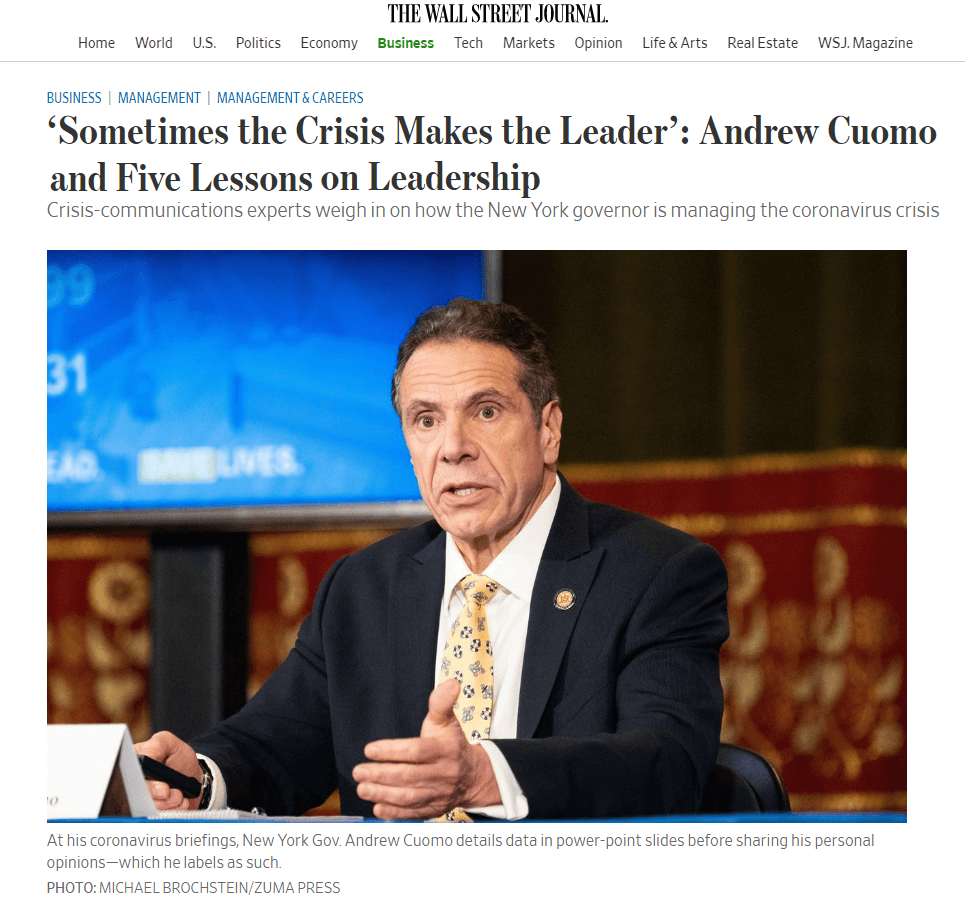
The nation is watching how New York Gov. Andrew Cuomo is handling the coronavirus outbreak, and it likes what it sees. Here’s how five crisis communications experts rate and react to his leadership style.
What America needs now is a field general, says Davia Temin, head of Temin & Co., a crisis-management and reputation consulting firm.
Someone who gives you facts, statistics, someone with a thoughtful, no-holds-barred, unvarnished approach. I’m not sure that Cuomo makes a perfect peacetime general, but he’s exactly what we need in a wartime general. He’s informed, his sleeves are rolled up, he’s walking the talk. He’s not abrogating the 6-foot rule just because he’s president or prime minister.
His brother’s situation has totally humanized him. It’s both intimate storytelling and authoritative, and that’s a very hard line to walk. I’m not sure I’d want to work for him—the pressure would be unholy—but he’s taking responsibility. He’s personally been trying to get ventilators, you get a feeling this is a guy in it up to his eyeballs.
In this kind of crisis, dysfunction kills. He has engaged our trust very quickly, and we need it more than we ever have, really. […read more]
Victoria’s Secret Faces New Sexual Misconduct Allegations
Jordyn Holman and Kim Bhasin, Bloomberg, February 3, 2020
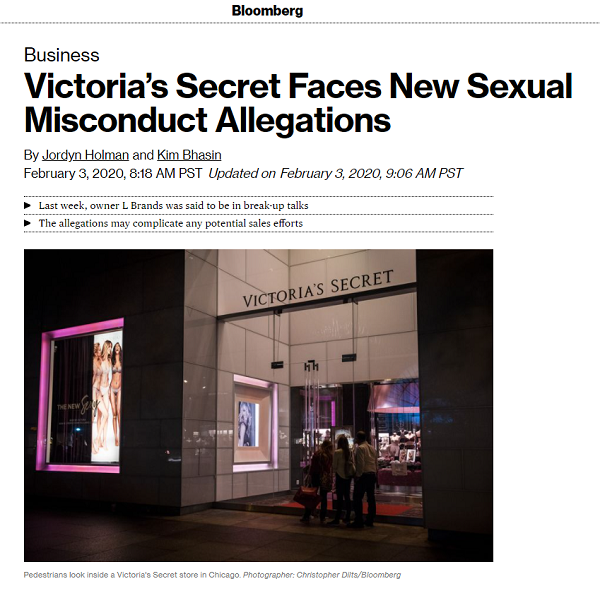
New allegations of sexual misconduct have surfaced at Victoria’s Secret as the brand tries to remake its image after years of scandal and slumping sales.
Female models and executives were bullied and harassed for decades at the lingerie chain, evidence of an “entrenched culture of misogyny,” according to a New York Times investigation published this weekend.
The revelations come days after reports that L Brands Inc., owner of the troubled retailer as well as Bath & Body Works, was in talks to break up the company and that longtime Chief Executive Officer Les Wexner could step down.
***
Davia Temin, CEO of crisis consulting firm Temin and Company, said the problems at Victoria’s Secret have become endemic, and it may need a new owner to survive. Patching up the brand by tweaking advertising won’t be enough, she said.
“Unfortunately, now Victoria’s Secret’s brand has gone to sleazy from sexy,” Temin said. “And no re-brand is going to fix that.” […read more]
Employees Speak Out—Against Their CEOs
Rachel Feintzeig, Charity L. Scott and Sharon Terlep, The Wall Street Journal, February 1, 2020
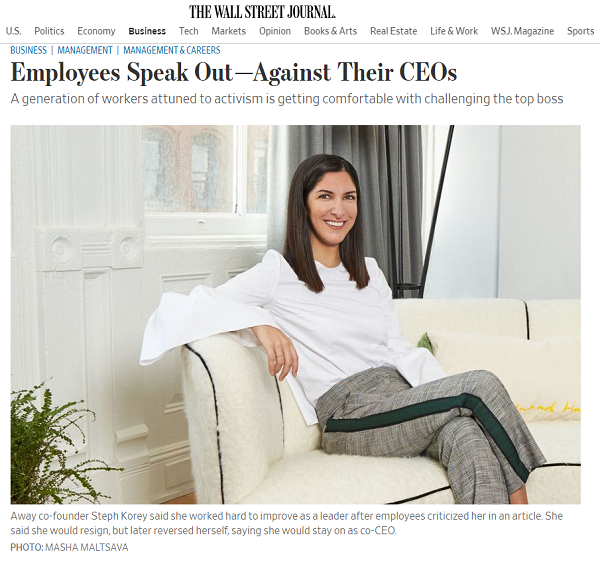
Chief executives routinely face barbs from investors and the media. Now some are dealing with criticism from a group closer to home: their own staffs.
Two recent workplace sagas—at online luggage seller Away and G/O Media, the publisher of former Gawker Media sites such as Deadspin and Gizmodo—highlight the more outspoken scrutiny that some leaders face from employees. At both companies, disgruntled workers led efforts to pressure their chief executives over behavior or decisions they didn’t like.
The top boss used to be more shielded from in-house criticism. With some exceptions, discontented employees tended to grumble among themselves or at a town hall meeting. They let labor leaders do the toughest talking, usually in pursuit of better wages or job security.
But at a time when digital forums like Slack and others are proliferating, workers aren’t just pressing employers to develop a stronger social conscience. They are taking leaders to task for their management style and, in some cases, calling for their jobs.
***
Companies are still trying to figure out how to handle crises born out of more openly critical employees, said Davia Temin, CEO of Temin and Co., a New York-based reputation and crisis-management firm.
“This is a new competency,” Ms. Temin said, “and I don’t think that it’s just a normal leadership competency that you learn in business school.” […read more]
Wells Fargo Quashes Hope That Its Scandals Are Nearly Resolved
Hannah Levitt, Bloomberg, January 27, 2020
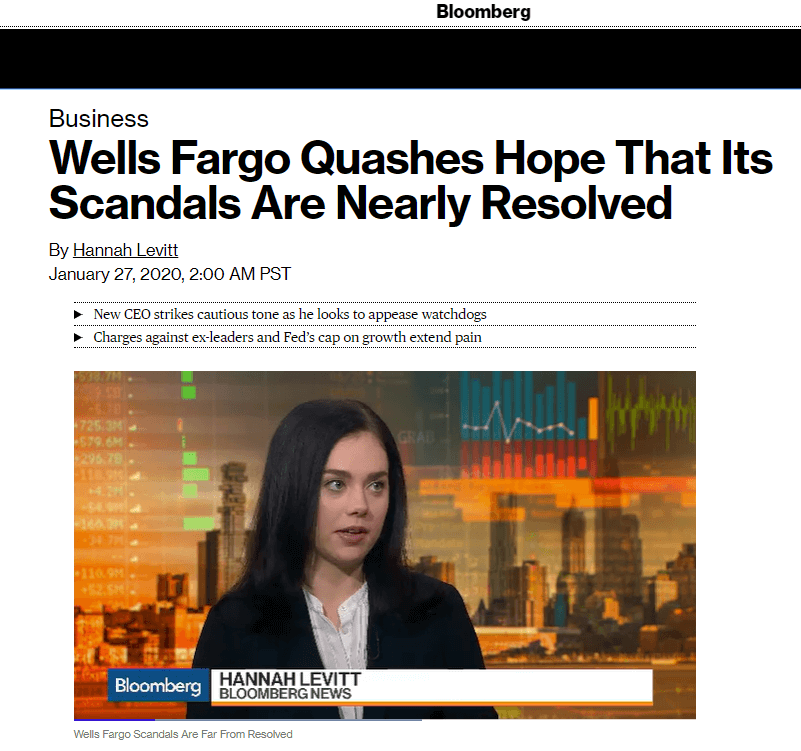
Wells Fargo & Co.’s finance chief was promising analysts they would be kept abreast of the bank’s efforts to resolve scandals when his new boss chimed in. “I just want to be clear, I’m not suggesting here that any of these public issues will be closed this year,” Chief Executive Officer Charlie Scharf said earlier this month. “The time frames will be driven by when we accomplish that work and when the regulators are satisfied by it.”
The firm has yet to reach settlements with the U.S. Department of Justice and the Securities and Exchange Commission after setting aside more than $3 billion for litigation in the second half of last year. And in its quarterly filings, the bank lists an array of other open-ended probes, investigations and sanctions including a Federal Reserve-imposed growth cap.
It’s a strikingly long tail for a scandal that began with the 2016 revelation that employees had opened millions of potentially fake accounts to meet sales goals, possibly overcharging customers by a few million dollars. That unleashed a public and political backlash that has kept Wells Fargo in a harsh light ever since.
“There’s this sort of free-floating anger and fury that’s out there in the populace, and anything that sticks its head up that’s a problem that isn’t resolved in the right way, it coalesces,” Davia Temin, founder of crisis consultancy Temin & Co., said in an interview. “That fury is magnificent — it is stunning in its destructive power.” […read more]
The Cost of MeToo Claims
Stephanie Forshee, Agenda, January 17, 2020

When supermodel Kate Upton went public two years ago and accused Guess co-founder Paul Marciano of groping her breasts — allegedly without her consent — word spread fast. Guess Inc. had been trading at $18.37 per share just a day earlier, but its stock dropped by 18% upon the news about Marciano, making it the worst trading day in six years as the company lost $250 million in value.
Due to the reputational damage brought by a MeToo claim, plus the piling on of shareholder lawsuits alleging the information was material for investors, analysts and executives have found themselves rethinking how to calculate the impact of these allegations on businesses.
Since MeToo received a platform in recent years, 285 companies have been hit with claims — 199 private companies and 86 public companies — according to Temin & Co., which tracks sexual misconduct allegations. Davia Temin, CEO of the risk and reputation firm, says, “Instead of putting their head in the sand not wanting to know, the best boards are saying, ‘We do want to know. We want to know before any problem arises.'” […read more] (subscription required)
More News Articles



